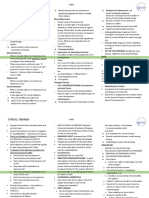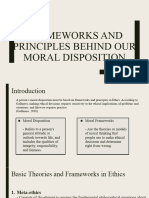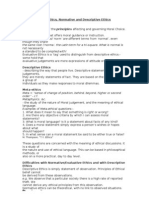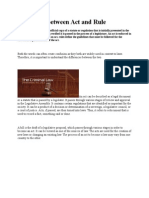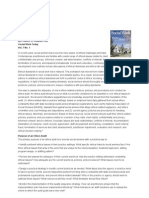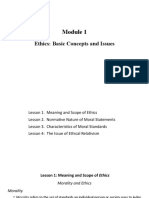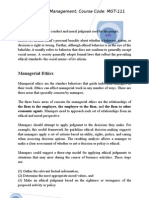100%(4)100% found this document useful (4 votes)
2K viewsUnethical Consumer Behaviour
Unethical Consumer Behaviour
Uploaded by
amolf22020This paper will focus on finding the major factors that lead to unethical behaviour. The identified factors will act as a major source of information for sellers thereby helping them in designing the marketing and promotional activities to avoid consumers from taking undue advantage of them. Once the why part of unethical consumer behaviour is identified this can help in designing a mechanism that will help address this issue which is currently haunting majority of suppliers in various industries.
Copyright:
© All Rights Reserved
Available Formats
Download as DOCX, PDF, TXT or read online from Scribd
Unethical Consumer Behaviour
Unethical Consumer Behaviour
Uploaded by
amolf22020100%(4)100% found this document useful (4 votes)
2K views13 pagesThis paper will focus on finding the major factors that lead to unethical behaviour. The identified factors will act as a major source of information for sellers thereby helping them in designing the marketing and promotional activities to avoid consumers from taking undue advantage of them. Once the why part of unethical consumer behaviour is identified this can help in designing a mechanism that will help address this issue which is currently haunting majority of suppliers in various industries.
Copyright
© © All Rights Reserved
Available Formats
DOCX, PDF, TXT or read online from Scribd
Share this document
Did you find this document useful?
Is this content inappropriate?
This paper will focus on finding the major factors that lead to unethical behaviour. The identified factors will act as a major source of information for sellers thereby helping them in designing the marketing and promotional activities to avoid consumers from taking undue advantage of them. Once the why part of unethical consumer behaviour is identified this can help in designing a mechanism that will help address this issue which is currently haunting majority of suppliers in various industries.
Copyright:
© All Rights Reserved
Available Formats
Download as DOCX, PDF, TXT or read online from Scribd
Download as docx, pdf, or txt
100%(4)100% found this document useful (4 votes)
2K views13 pagesUnethical Consumer Behaviour
Unethical Consumer Behaviour
Uploaded by
amolf22020This paper will focus on finding the major factors that lead to unethical behaviour. The identified factors will act as a major source of information for sellers thereby helping them in designing the marketing and promotional activities to avoid consumers from taking undue advantage of them. Once the why part of unethical consumer behaviour is identified this can help in designing a mechanism that will help address this issue which is currently haunting majority of suppliers in various industries.
Copyright:
© All Rights Reserved
Available Formats
Download as DOCX, PDF, TXT or read online from Scribd
Download as docx, pdf, or txt
You are on page 1of 13
Page 1
Unethical Consumer Behaviour in Marketing
Consumer Behaviour Term Paper
Page 2
Introduction
Consumer Behaviour deals with the buyer side of exchange process. A vast research on marketing
ethics has been carried out in recent years which focussed mainly on the supplier side of exchange
process; however the buyer side remains un-researched or less researched. Consumers are one of the
major stakeholders in any marketing activity however a limited research activity has been performed
to understand the ethics of a consumer and his buying/decision making behaviour which is closely
associated with ethics. The current era is an ethics era where a companys marketing and
promotion activities should also take into consideration the ethics side of the consumers to avoid
falling prey to the different unethical gimmicks i.e. consumer misconduct by which he gains at the
expense of the seller, played by the consumer. Thus understanding the ethics of consumers is must to
avoid any potential losses that the company might face because of the unethical consumer behaviour.
In this paper we will focus on finding out the different factors that lead to the unethical behaviour
being frequently observed among the consumers. Based on the factors identified we will look into
what measures companies can take to prevent occurrence of such incidents and at the same time how
marketers can predict the unethical consumer behaviour. Also we can suggest the companies based on
the observed factors if the current measures being followed are sufficient to address the issue of
unethical consumer behaviour or it needs some modification which will help in addressing this
challenge faced by the sellers. This phenomenon of unethical consumer behaviour is being observed
very frequently in recent years thereby making conditions worse for the seller in an already highly
competitive market setting.
Objective
The objective of the term paper is to find out the reasons behind the unethical consumer behaviour
being observed more prominently in recent years. In other words the paper will address the why
question behind the unethical consumer behaviour. A limited research has been carried out while
unearthing the factors that lie behind the consumers unethical behaviour. This paper will focus on
finding the major factors that lead to unethical behaviour. The identified factors will act as a major
source of information for sellers thereby helping them in designing the marketing and promotional
activities to avoid consumers from taking undue advantage of them. Once the why part of unethical
consumer behaviour is identified this can help in designing a mechanism that will help address this
issue which is currently haunting majority of suppliers in various industries.
Page 3
Literature Review
The majority of literature available on marketing ethics deals with the seller side where as the buyer
side research is new and limited research has been carried out in this area. Consumer behaviour is
identified as a new topic in the area of consumer research which also includes among others the
unethical consumer behaviour (Hirschman, 1991; Holbrook, 1994; Mick, 1996). A significant amount
of literature has emerged around consumer ethics since the pioneering studies carried out by Muncy
and Vitell (Muncy & Vitell, 1992; Vitell & Muncy, 1992). Unethical consumer behaviour is prevalent
in everyday life and has several severe consequences for the sellers. So The understanding of
consumer ethics is crucial to todays marketers and policy makers (Chan et al., 1998, p.1163).
Personal characteristics of the consumer play a pivotal role in determining the consumer behaviour. A
lot of research has been carried out on the personal and psychological factors of the consumer
whereas the consumers basic value system, his ethical beliefs which are very helpful in determining
the consumer behaviour remains less researched.
Prior to 1990 the research was focussed mainly on seller side ethics however after 1990s the research
started focussing on the buyer side. There existed some research before 1990s which focussed on
buyer side and can be classified into 5 categories:
Some authors have concentrated mainly on a single component of unethical consumer behaviour.
The investigated areas mainly included shoplifting, ecologically related consumption and
consumer views on games like gambling and lottery.
Some concentrated on providing normative guidelines for sellers and buyers on issues related to
ethics. This involves laying out of code of ethics for buyers as well as chalking out strategies to
tackle the abuses by the buyer.
Some examined the double standards that exist between consumer perception of acceptable
consumer behaviour and customers belief of acceptable business practices.
Some developed theoretical models for getting a better understanding of ethical decision making
process in marketing
While some authors focussed specifically on different unethical consumer practices.
However post 1990, an increase in consumer ethics research has been observed and it focused on
various consumer behaviour topics thereby leading to formulation of different frameworks and
models that correctly captured the factors leading to either ethical or unethical behaviour of the
consumers. Based on the work of Wilkes (1978), Muncy and Vitell developed the Consumer Ethics
Scale which has been the most common tool in the consumer ethics literature to date; Also Forsyths
ethical ideology and the Machiavellianism trait have been identified as most important determinants
of ethical discrepancies between individuals; and extensive empirical work has been conducted to
investigate the influence of cultural environment and personal characteristics on consumer ethics.
Page 4
Ethical Decision Making Frameworks for Consumers
1. Ethical Decision Making Model
The research literature talks about three theoretical models of decision making in the situations which
involve ethical issues in the field of marketing (Ferrell & Gresham, 1986; Hunt & Vitell, 1986, 1993;
Trevino, 1986). Each of these three models has similarities in terms that each of it identifies the
triggering construct which initiates the ethical decision making process and also identifies behaviour
of the buyer as the outcome of this process. These models also highlight the relative importance of
various factors that lie behind the decision making process.
Along with the similarities mentioned above there are several differences among these models. The
Trevino model and the Ferrell-Gresham model present the individual decision making as a single
factor leading to buyers behaviour, whereas the Hunt-Vitell model explains the individual decision
making process, the various philosophical theories (deontology and teleology) which explain a
decision makers (buyers) ethical judgments. Hunt-Vitell model is the only model that can be applied
in individual contexts such as consumer behaviour by eliminating the parameters of organizational,
professional and industry environment. This explains that Hunt-Vitell model is best suited for
understanding the consumer ethics and can guide well in determining the major reasons for a buyers
unethical behaviour. So we will now look into the Hunt-Vitell model as it best suits our needs.
2. Hunt-Vitell Model
The perception of an ethical problem by an individual decision maker in a situation is accompanied
with the perception of various alternatives that can be used to address the problem. Once these various
alternatives are arrived at, two major ethical evaluations can take place namely a deontological
evaluation and teleological evaluation.
The deontological evaluation emphasizes on certain actions and behaviours of the individual
consumer whereas teleological evaluation focuses on the outcome of these behaviours. While making
a deontological evaluation, the individual consumer evaluates the inherent rightness versus wrongness
of various actions and behaviours. According to this model, the deontological evaluation includes a
comparison of perceived alternatives with the established deontological norms that depict the
individual consumers personal values.
In teleological evaluation, a particular behaviour or the alternative chosen is considered most ethical if
the consequences lead to a superiority of good over bad than any other alternative being perceived by
the individual consumer. This evaluation contains more major constructs:
Perceived consequences of each alternative for various stakeholder groups
Probability that each consequence will occur to each stakeholder group
Desirability or lack of desirability of each consequence
Page 5
Importance of each stakeholder group
The individual consumers teleological evaluation is influenced by these constructs and the output of
this evaluation is the individuals beliefs about the relative good versus bad produced by each of the
possible alternative.
In most of the situations faced by an individual consumer, the ethical judgements are a function of
both deontological and teleological evaluation. However a recent test of Hunt-Vitell model revealed
that consumers rely mainly on deontological norms and less on teleological norms while forming the
ethical judgements.
Once a consumer chooses behaviour for a situation there is an evaluation of the consequences that can
result from the behaviour. These consequences act as a feedback to an individuals personal
experiences when compared to the expected consequences.
The Hunt-Vitell model consists of several background factors that influence the decision making
process. Out of the various factors only the culture and personal characteristics are important for
consumer ethics.
Figure 1: The Hunt-Vitell model Consumers ethical decision-making framework
3. Consumer Ethics Scale
Most of the research on the topic of consumer ethics is done by Vitell and Muncy. Based on the work
of Wilkes (1978), Vitell and Muncy came up with the Consumer Ethics Scale which examines the
extent to which consumers believe that a certain questionable consumer situation is either ethical or
unethical. Vitell and Muncy used a sample of 569 heads of the household to establish a four factor
structure of ethical beliefs denoting the consumers ethical judgements which are determined by:
Whether or not the consumer has actively or passively benefited from the activity
Whether the activity can be perceived as legal or illegal
The degree of harm to the seller
Page 6
The first category of the scale actively benefiting from an illegal activity consists of actions that are
initiated by the consumer and that are universally perceived as illegal. In the second category of the
scale passively benefiting at the expense of others consumers do not initiate any action specific to
receiving the benefit however they do take advantage of the mistakes committed by the seller. In the
third category of the scale actively benefiting from a questionable behaviour the consumer might be
involved in an action that might not be perceived as illegal (e.g. using an expired coupon). In the
fourth category of the scale consumers believe that their actions are not causing any harm to the seller
(e.g. recording a music album instead of buying it)
The study of the sample revealed that consumers believed that it was more unethical to gain benefit
from actively involving in an illegal activity than getting passively involved. The reason behind this
may be that as long as they are not initiating the activity they are not doing as wrong as active
involvement. At the same time deceptive practices were not considered to be as unethical as passively
benefiting from the illegal activity. Some of the activities were not considered by consumers as
unethical at all, many of the consumers indulged in these activities like copying of intellectual
property.
The Consumer Ethics scale has been proven to be useful in many scenarios even in the case of cross-
cultural societies. This can be found in the works of Al-Khatib et. Al. (2004), Rawwas et.al. (2005)
and Swaidan et. al. (2003). Al-Khatib et. al. (2004) used this scale to investigate Romanian
consumers. Rawwas et. al. (2005) used the scale to compare the ethical beliefs of Turkish and
American consumers and Swaidan et. al. (2003) used the scale to explore the ethical beliefs of African
Americans.
The consumer ethics scale is represented as follows:
Page 7
Figure 2: Four factor structure of consumers ethical beliefs by Muncy and Vitell
Page 8
Factors Responsible for Ethical/Unethical Consumer Behaviour
1. Moral Philosophy
This refers to the guiding ideology that the individuals apply while judging a situation whether it is
right or wrong. According to Forsyth (1980, 1992) moral philosophies can be classified into idealism
(extent to which an individual believes that the right action leads to the desirable outcome i.e.
deontological perspective) and relativism (extent to which an individual rejects universal moral rules
in favour of the subjective or situational approaches i.e. teleological perspective).
Based on these two uncorrelated constructs described above, Forsyth classified people in four
different ethical types namely subjectivist, situationist, exceptionist and absolutist. This is
demonstrated in the figure below.
Figure 3: Frosyths four ethical types
2. Machiavellianism
This personality construct is another important antecedent of consumers for ethical decision making.
Hunt and Chonko (1984) have described Machiavellianism as a negative epithet indicating an
immoral way to manipulate others to accomplish ones own purpose. A Machiavellian personality can
be described as emotionally detached. Machiavellian individuals are more likely to accept ethical
questionable consumer practices because of their emotional detachment with others. The empirical
evidence from several studies carried out till date suggests that highly Machiavellian consumers are
little concerned for conventional morality and therefore are more likely to engage in unethical
consumer behaviour when their self-interest is involved.
Page 9
3. Cultural Environment
Hunt-Vitell model includes cultural environment as one of the vital factor leading to the ethical
decision making process. This has led the research on consumer ethics to be culturally diverse i.e.
spread across two or more countries. These studies indicate that cultural differences exist between
consumers ethical ideology due to difference in economic development, degree to which a country
holds its international identity, difference in Hofstedes cultural dimension for the country,
geographical conditions, war and terrorism.
4. Personal Characteristics
These are also included in the Hunt-Vitell model as a factor leading to ethical decision making
process. The personal characteristics include socio-demographic variables, individual differences,
attitudinal characteristics, moral development and religion.
4.1 Socio-Demographic Variables
Age has a positive effect on the ethical beliefs of the consumer. More is the age more is the
likelihood of rejecting questionable consumer practices.
There has been mixed results when gender is taken into consideration. Some of the studies carried
out have found out that women are more concerned with ethical issues than men. While some of
the research has failed to support the effect of gender on unethical consumer behaviour.
Education is also one of the socio-demographic variables which can be taken into consideration. It
has been found that the less educated consumers are more ethical as compared to the consumers
who have higher level of education. This effect has been attributed to the different ways a highly
educated consumer employs to get benefit from the seller because of good knowledge and
information.
When income is considered, it has been observed that there is a negative effect between income
and unethical behaviour by consumers.
When marital status is taken into consideration, it has been observed that married people have a
tendency to accept questionable practices as compared to the single individuals. However there is
no uniformity in the research findings.
4.2 Attitudinal Characteristics
The study carried out by Vitell and Muncy (1992) states that attitude towards illegal activities and
attitude towards business have significant correlation with the ethical beliefs of the consumers.
Consumers who are negative towards business are less inclined to consider the different consumer
practices as unethical.
Page 10
4.3 Individual Differences
It has been observed that consumers with high propensity for risk and are autonomous, innovative
and aggressive tend to be less ethical. Similarly consumers with higher need for closure tend to
have ethical beliefs. An alienated consumer is less likely to follow norms and therefore is more
likely to accept the ethically questionable consumer behaviour. There is a negative relationship
between materialism and the ethical beliefs of the consumer. A value conscious consumer is more
likely to engage in unethical consumer practices like purchasing pirated goods.
4.4 Religion
Religion plays a very important role in determining ethical beliefs of consumers. Religiosity has a
negative relationship with unethical consumer behaviour.
Page 11
Analysis of Unethical Consumer Behaviour in Indian Context
An Indian consumer is highly cost conscious and is very demanding when he goes for shopping. So it
is very difficult for a seller to understand the complex needs of the consumers and make them
satisfied with their offering. Also the existence of huge competition in the market leads every seller to
indulge in practices that will help attract maximum consumers. In this process seller introduces
various offers and different promotional activities to increase his sales. It is generally assumed that
consumers will behave ethically and would not indulge in practices that will benefit them at the cost
of the seller. However based on the various factors identified above it is clear that a value conscious
consumer like an Indian consumer is more likely to indulge in unethical consumer practices. So while
designing the promotional activities the seller should take into consideration the ethical aspect of
consumers so that the consumers do not take an undue advantage of him.
It has also been observed that people of India are greedy when money comes into picture. They have a
tendency to gain maximum advantage at the lowest cost. To cater to such a customer, the seller needs
to be extremely cautious and at the same time customer-centric to garner more sales. Also the level of
education in the country is increasing thereby leading to consumers getting information on various
issues readily available. From the factors mentioned above it has been observed that the more the
information with the consumer more likely that he will indulge in unethical consumer practices
thereby gaining at the expense of the sellers.
The sellers now-a-days have started implementing various mechanisms that help them in addressing
this issue however a lot of areas are still an area of concern for them. However if they implement lot
of measures to address the issue it will affect the sales as consumer also want some liberty and
comfort while shopping. Thus it is a double-edged sword and a perfect mix of consumer comfort and
regulatory mechanism for unethical consumer behaviour needs to be arrived at for a win-win situation
for both the consumers and suppliers.
Page 12
Conclusion
The seller has to keep in mind that consumers ethical ideology which is closely related with the
ethical judgements is an important factor while formulating various customer friendly initiatives. The
ethical ideology of a consumer largely influences the behaviour of the consumer which in turn helps
the sellers to either gain or lose from his current operations in the market. The various factors leading
to unethical consumer behaviour will act as a vital source of information for the seller as it will help
them in bridging the gap if any that exists in the current mechanism in place. Also it will help in
designing a new mechanism that will address these factors in a more effective manner. Along with
addressing these factors companies can come up with a course of action including rewarding ethical
behaviour, prosecuting the unethical consumers and also stand on their ground when they believe that
the consumer is behaving unethically. The reason behind the growth of unethical behaviour is also the
attitude of suppliers of ignoring and excusing the occurrences of unethical events. The suppliers also
need to be stern when they know that they are correct and should stop worrying about the customer
power as they are correct in this scenario. Suppliers should understand that if they let go the unethical
behaviour then they are no better than the unethical consumers themselves.
Page 13
References
Chan A., S. Wong & P. Leung (1998), Ethical Beliefs of Chinese Consumers in Hong Kong, Journal
of Business Ethics, 17 (11), 1163 1170
Chonko L.B. & Hunt S.D. (1985), Ethics and Marketing Management An Empirical Examination,
Journal of Business Research, 13 (4), 339-359
Emin Babakus, T. Bettina Cornwell , Vince Mitchell, Bodo Schlegelmilch (2004), Reactions to
unethical consumer behaviour across six countries, Journal of Consumer Marketing, 21 (4), 254-263
Kelley S.W., O.C. Ferrell & S.J. Skinner (1990), Ethical Behavior among Marketing Researchers
An Assessment of Selected Demographic Characteristics, Journal of Business Ethics, 9 (8), 681-688
Marylyn Carrigan, Ahmad Attalla (2001), The myth of the ethical consumer do ethics matter in
purchase behaviour, Journal of Consumer Marketing, 18 (7), 560-577
Muncy J.A. & S.J. Vitell (1992), Consumer Ethics: An Investigation of the Ethical Beliefs of
the Final Consumer, Journal of Business Research, 24 (4), 297-311
Vitell S.J. & J.A. Muncy (1992), Consumer Ethics: An Empirical Investigation of Factors Influencing
Ethical Judgments of the Final Consumer, Journal of Business Ethics, 11 (8), 585-597
You might also like
- Gorman-Murray - Rethinking Queer Migration Through The BodyDocument18 pagesGorman-Murray - Rethinking Queer Migration Through The BodyDanilo CardosoNo ratings yet
- Business Frame Work and EthicsDocument24 pagesBusiness Frame Work and EthicsYuvaraj NithyanandamNo ratings yet
- Theories and Virtues in EthicsDocument3 pagesTheories and Virtues in EthicsShaina GraceNo ratings yet
- Normative Ethics Readings19 20 1Document27 pagesNormative Ethics Readings19 20 1JHUZELL DUMANJOGNo ratings yet
- Reporting EthicsDocument17 pagesReporting EthicsJabe neyNo ratings yet
- Public Policy Formulation 2Document13 pagesPublic Policy Formulation 2Abdela Aman MtechNo ratings yet
- Moral TheoriesDocument20 pagesMoral Theoriessheila roxasNo ratings yet
- Business Ethics - Theories and PerspectivesDocument12 pagesBusiness Ethics - Theories and PerspectivesBrenton HewittNo ratings yet
- Ethics CSRDocument45 pagesEthics CSRKhsmd Atul AlmuhaimenNo ratings yet
- Chapter IIIDocument30 pagesChapter IIIWENCY DELA GENTENo ratings yet
- What Is Philosophy and Ethics?Document21 pagesWhat Is Philosophy and Ethics?Jonna Rose AgramonNo ratings yet
- Moral Theories and Mental Frames and Why They Are Important: Bydecember 12, 2020uncategorizedDocument3 pagesMoral Theories and Mental Frames and Why They Are Important: Bydecember 12, 2020uncategorizedMarlon AlanoNo ratings yet
- Stages of Moral Development: Learning OutcomesDocument5 pagesStages of Moral Development: Learning OutcomesJustin Gil NojaNo ratings yet
- 5th Reason, Impartiality, and Moral Courage M3L2Document5 pages5th Reason, Impartiality, and Moral Courage M3L2JamNo ratings yet
- Group 6 Frameworks and Principles Behind Our Moral DispositionDocument11 pagesGroup 6 Frameworks and Principles Behind Our Moral DispositionHamim ImamNo ratings yet
- Gec 8 Lesson 2 Moral and Non Moral StandardsDocument67 pagesGec 8 Lesson 2 Moral and Non Moral StandardsaezaleagacalNo ratings yet
- Met A Ethics Normative and Descriptive EthicsDocument2 pagesMet A Ethics Normative and Descriptive Ethicssheikh_aamir593510No ratings yet
- 2 - Dilemma and Foundation of MoralityDocument11 pages2 - Dilemma and Foundation of Moralityvertine belerNo ratings yet
- Difference Between Act and RuleDocument2 pagesDifference Between Act and RuleRaja GopiNo ratings yet
- Ethical Theories:: Roderick T. Long Auburn Dept. of PhilosophyDocument38 pagesEthical Theories:: Roderick T. Long Auburn Dept. of PhilosophybaluNo ratings yet
- Ethics Audit: Jan./Feb. 2007Document9 pagesEthics Audit: Jan./Feb. 2007Parvathy KarthaNo ratings yet
- Business Ethics HandoutsDocument4 pagesBusiness Ethics HandoutsAsterCauliNo ratings yet
- Ethics: Basic Concepts and IssuesDocument15 pagesEthics: Basic Concepts and IssuesAdam Martinez100% (1)
- Lesson 2 EthicsDocument20 pagesLesson 2 Ethicselle lee100% (1)
- Freedom Vs DeterminismDocument25 pagesFreedom Vs DeterminismAmver Mae Katri SuguitanNo ratings yet
- Normative EthicsDocument11 pagesNormative Ethicsdy jhane100% (2)
- What Is The Value of LifeDocument3 pagesWhat Is The Value of LifeJoi PreconesNo ratings yet
- Anthropological PerspectiveDocument5 pagesAnthropological PerspectivePrincess CaranguianNo ratings yet
- F. CultureDocument14 pagesF. CultureTeree ZuNo ratings yet
- Care Ethics: Origins and Motivations: by Dr. Anumita ShuklaDocument6 pagesCare Ethics: Origins and Motivations: by Dr. Anumita ShuklaMayank Bora100% (1)
- Ethics Semi-Final ExamDocument7 pagesEthics Semi-Final ExamJunriv RiveraNo ratings yet
- Power Point Presentation ON Ethics in MarketingDocument22 pagesPower Point Presentation ON Ethics in MarketingnancykapoorNo ratings yet
- Stakeholder Participation in Policy Formulation-1Document24 pagesStakeholder Participation in Policy Formulation-1Benard Hadad Chale100% (1)
- ETHICSDocument13 pagesETHICSHANNA MARIE PAYBANo ratings yet
- Ethics: Right Deed Wrong DeedDocument19 pagesEthics: Right Deed Wrong DeedKillua ZoeldyckNo ratings yet
- GEC 8 Lesson 1 Introduction To EthicsDocument8 pagesGEC 8 Lesson 1 Introduction To EthicsIsabel HernandezNo ratings yet
- Gec 8-Ethics: The Ethical Dimension of Human ExistenceDocument7 pagesGec 8-Ethics: The Ethical Dimension of Human Existencekaligay69No ratings yet
- Feelings and Moral Decision-MakingDocument9 pagesFeelings and Moral Decision-Makingroselyn ayensaNo ratings yet
- Making Ethical DecisionsDocument19 pagesMaking Ethical DecisionsGabs VillanuevaNo ratings yet
- The Ethical Dimension of Human Existence 0Document18 pagesThe Ethical Dimension of Human Existence 0Joy DulsaNo ratings yet
- Individual Factors Moral Philosophies and ValuesDocument19 pagesIndividual Factors Moral Philosophies and ValuesIftikhar Ahmed100% (1)
- Ethics Essay Utilitarian EthicsDocument2 pagesEthics Essay Utilitarian EthicsLleana TanNo ratings yet
- Kantian EthicsDocument142 pagesKantian EthicsGarvit RandhawaNo ratings yet
- Origins of EthicsDocument10 pagesOrigins of EthicsMasz KamarudinNo ratings yet
- Organizational EthicsDocument14 pagesOrganizational EthicsMahabub Alam100% (1)
- Moral Dilemma in EthicsDocument3 pagesMoral Dilemma in EthicsKimberly Wyne SantosNo ratings yet
- 2.2 Reason and Impartiality As Minimum Requirement For MoralityDocument5 pages2.2 Reason and Impartiality As Minimum Requirement For MoralityMarifer CavintaNo ratings yet
- Lesson 1 - EthicsDocument17 pagesLesson 1 - EthicsJoesa Mae Chan BPANo ratings yet
- The Development of Moral Character of The Moral - EdnaDocument22 pagesThe Development of Moral Character of The Moral - EdnaBren GuzmanNo ratings yet
- Cultural RelativismDocument4 pagesCultural RelativismJameelaNo ratings yet
- Summary EthicsDocument5 pagesSummary EthicsLance BautistaNo ratings yet
- Factors of DiversityDocument3 pagesFactors of DiversityJericRonioNo ratings yet
- Chapter 4: The Fundamental Principles of Ethics: Reporter 1: Obinguar, Ma. Angelica UDocument5 pagesChapter 4: The Fundamental Principles of Ethics: Reporter 1: Obinguar, Ma. Angelica UCoke Aidenry SaludoNo ratings yet
- Frameworks and Principles Behind Our Moral Disposition Virtue Ethics Immanuel KantDocument12 pagesFrameworks and Principles Behind Our Moral Disposition Virtue Ethics Immanuel KantTulungan Para sa Modular at Online Classes100% (2)
- ConsumerDocument34 pagesConsumerSanyam AgarwalNo ratings yet
- Moral Dilemma g4Document24 pagesMoral Dilemma g4baguiorechelleann100% (1)
- Lesson 1 Basic Concepts of EthicsDocument24 pagesLesson 1 Basic Concepts of EthicsJohn Fritz Singh100% (1)
- Business EthicsDocument12 pagesBusiness EthicshezronNo ratings yet
- EthicsDocument15 pagesEthicsmarjorie magsinoNo ratings yet
- Compelling Returns: A Practical Guide to Socially Responsible InvestingFrom EverandCompelling Returns: A Practical Guide to Socially Responsible InvestingNo ratings yet
- BIOETHICS (Prelims)Document12 pagesBIOETHICS (Prelims)s2020106372No ratings yet
- Mastersheet MGMT 625Document158 pagesMastersheet MGMT 625Adee KhanNo ratings yet
- Ethics Lesson 6Document15 pagesEthics Lesson 6Yassi BrinNo ratings yet
- Chapter 07 Individual Factors Moral Philosophies and ValuesDocument30 pagesChapter 07 Individual Factors Moral Philosophies and Valuesbusranur.kamanNo ratings yet
- (Mind Association Occasional Series) Lillehammer, Hallvard - Mellor, D. H. - Ramsey, Frank Plumpton (Eds.) - Ramsey's Legacy-Clarendon Press, Oxford University Press (2005) PDFDocument193 pages(Mind Association Occasional Series) Lillehammer, Hallvard - Mellor, D. H. - Ramsey, Frank Plumpton (Eds.) - Ramsey's Legacy-Clarendon Press, Oxford University Press (2005) PDFFederico Nahuel100% (2)
- Germain Grisez - A Contemporary Natural-Law Ethics. 1989 Marquette University Press.Document20 pagesGermain Grisez - A Contemporary Natural-Law Ethics. 1989 Marquette University Press.filosoph100% (1)
- Wilhelm Dilthey The Essence of PhilosophyDocument86 pagesWilhelm Dilthey The Essence of Philosophyjgomespinto100% (2)
- Module 7 GE EthicsDocument6 pagesModule 7 GE EthicsNoir TejorNo ratings yet
- Chapter 3 Teleological PerspectiveDocument15 pagesChapter 3 Teleological PerspectiveChienette MedranoNo ratings yet
- Strongly Embodied Functionalism - SachsDocument24 pagesStrongly Embodied Functionalism - SachsEnara GarciaNo ratings yet
- The Dialectics of Law - Chhatrapati SinghDocument11 pagesThe Dialectics of Law - Chhatrapati SinghPranav Kumar VasishtaNo ratings yet
- Axelrod Spinoza1925Document18 pagesAxelrod Spinoza1925Anonymous 6oTdi4No ratings yet
- Are Children Intuitive Theists''? Reasoning About Purpose and Design in Nature: Deborah KelemenDocument7 pagesAre Children Intuitive Theists''? Reasoning About Purpose and Design in Nature: Deborah KelemenConall CashNo ratings yet
- Foucault, Binswanger, Dream and ExistenceDocument53 pagesFoucault, Binswanger, Dream and ExistenceSteffi DanielleNo ratings yet
- Falding Functional Analysis in SociologyDocument10 pagesFalding Functional Analysis in SociologyRomolo Giovanni Capuano100% (1)
- Section FDocument42 pagesSection FaspirantuscmaNo ratings yet
- Thompson VarelaDocument18 pagesThompson VarelaGiannis NinosNo ratings yet
- Chapter 2 - Ethical TheoryDocument23 pagesChapter 2 - Ethical TheoryMohamad FarisNo ratings yet
- Paul J Thibault Social Semiotics As Praxis Text Meaning and Nabokov S Ada Theory and History of Literature 1991Document321 pagesPaul J Thibault Social Semiotics As Praxis Text Meaning and Nabokov S Ada Theory and History of Literature 1991Ellie GeorgievNo ratings yet
- Said 1Document12 pagesSaid 1Azreen ZuhairiNo ratings yet
- The Force of Existence. Looking For Spinoza in HeideggerDocument34 pagesThe Force of Existence. Looking For Spinoza in Heideggerpurandarbhat21No ratings yet
- Theories of EthicsDocument12 pagesTheories of EthicsVinay Ramane86% (7)
- The Timespace of Human Activity On Performance, Society, and History As Indeterminate Teleological EventsDocument55 pagesThe Timespace of Human Activity On Performance, Society, and History As Indeterminate Teleological Eventsasskeeper153No ratings yet
- Chapter4 Lesson1 EthicalFrameworkDocument15 pagesChapter4 Lesson1 EthicalFrameworkMichel Jay Arguelles EspulgarNo ratings yet
- Classical NaturalismDocument12 pagesClassical NaturalismNits0% (1)
- Living Under God's Law - Christian EthicsDocument352 pagesLiving Under God's Law - Christian Ethicsjoeschmuckitelli100% (1)
- Aronson-2001-Canadian Journal of Administrative Sciences - Revue Canadienne Des Sciences De...Document13 pagesAronson-2001-Canadian Journal of Administrative Sciences - Revue Canadienne Des Sciences De...Shakil AhmedNo ratings yet
- Business Ethics Module - 3 NotesDocument23 pagesBusiness Ethics Module - 3 NotesamjithamaluzNo ratings yet


